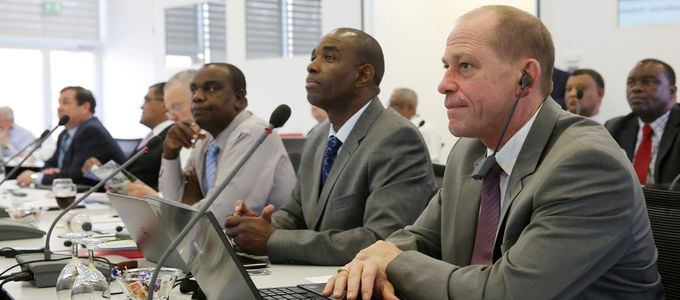
It was the top subject of discussion for the District Apostles and Apostles over this rapidly closing year: work on the new concept of ministry. What is so important about this, and where will the journey take us? Following is a brief review and a look ahead.
The cornerstones are in place, the foundations have been laid: the autumn conference of the District Apostles in Perth, Australia formulated some key statements in matters concerning the “Concept of Ministry”. The Church Work Group “Questions of Faith” has now been given the mandate to draft a Special Edition article for the Divine Service Guide. The Divine Service Guide is a publication that communicates information from the Church leadership directly to the ministers of the Church. It is produced in over 70 languages.
Related questions: both theological and societal in nature
But why does a Church with a solid 150 years of tradition even have to give any thought to its ministerial conception? After all, with the publication of the Catechism in the year 2012, the New Apostolic Church presented the world with quite a comprehensive written foundational text. And the whole seventh chapter of this work deals with ministry. “However, other related questions are being raised now,” said retired Chief Apostle Leber already in 2013.
What is a ministry and what is a service? What happens during ordination? These are just some of the basic questions. And very closely associated with these are another two questions: what is a ministerial mandate and what constitutes an organisational task? What is ministerial authority and what is a leadership function?
Once the theological aspects have been thought through, the focus would shift to the related societal questions, said Chief Apostle Jean-Luc Schneider back in 2014 during a panel discussion at the International Church Convention. Who is permitted to bear a ministry? What will the congregation accept? What things will work on an international level and what things will only work in some regions?
Three levels: the ministries and their powers
This much is clear—as a measure of ministerial authority, the New Apostolic faith only acknowledges three levels of ministry:
- the Deacon, who has the authority to proclaim the word of God,
- the Priest, who, in addition to the above, also has the mandate and authority to dispense Holy Baptism with water, proclaim the forgiveness of sins, as well as consecrate and dispense Holy Communion, and
- the Apostle, who, beyond these powers, also has the authority to baptise with the gift of the Holy Spirit and ordain ministers.
All further distinctions—particularly with regard to the priestly ministries—derives from the basic idea that the Church was to be restored to its original structure and form. However, a holistic view of all the relevant Bible passages shows us that the early church did not possess a uniform ministerial structure. For example, Elders and Bishops both had the very same function as rectors over the congregations at the time. Even the designation only differed depending on whether they led congregations characterised predominantly by Jewish Christians or Greek Christians.
Establishing doctrine: working together around the world
Concrete work on the conception of ministry has been ongoing since the spring of 2014. The Work Group “Questions of Faith” began by assembling all the necessary foundations for theological consideration, which also included the historical background. Since then, the panel has worked to formulate various questions on the subject and prepare possible answers to them. The International District Apostle Meeting has been discussing and debating these matters regularly since March 2015.
At the initiative of the Chief Apostle, all Apostles around the world were drawn into the consultation process as of spring 2016—either in writing or in conferences such as those held in Frankfurt, Germany, Daejeon, South Korea, and Los Angeles, USA. After all, the Catechism describes the apostolate as the ministry responsible for establishing doctrine. Beyond that, the organisational structure of the ministerial concept will also take cultural dimensions into account.
During the District Apostle Meeting in Australia, Chief Apostle Schneider gave voice to his enthusiasm over the progress made to date, expressing how impressive it is to watch these diverse aspects of the subject fill up with spirit and life such that an overall context comes into being as a result.
Photo: Oliver Rütten




